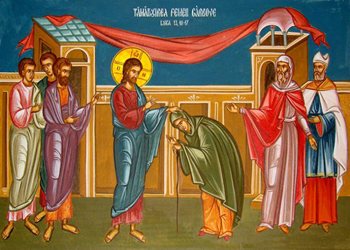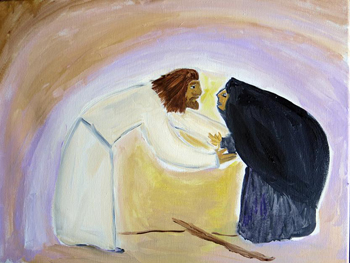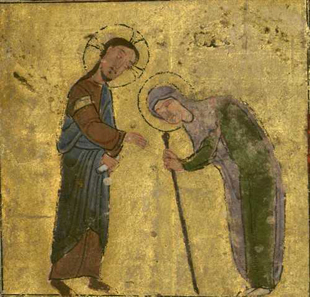For Sunday August 25, 2019
Lectionary Readings (Revised Common Lectionary, Year C)
Isaiah 58:9b-14
Psalm 103:1-8
Hebrews 12:18-29
Luke 13:10-17
I don’t know her name. I don’t know where she comes from. I don’t know why she appears in the synagogue on the particular Sabbath day our Gospel reading records. But I can picture her. A weary woman, resilient and resigned. A woman “bent over,” and “quite unable to stand up.” A woman who spends her long days staring at the ground, staring at her own feet, staring at the dusty sandals of those who pass her by on the road. Not because she wants to avoid eye contact, or miss each morning’s sunrise, or forget what the stars look like, or never raise her face to the evening breeze, but because she has no other choice.
Luke tells us that by the time the bent over woman encounters Jesus, she’s been crippled for eighteen years. I wonder if she showed up for worship every weekend during those exhausting two decades. I wonder if anyone noticed her. I wonder what hope or meaning or solace the weekly ritual afforded her — if any. I wonder what sort of life she shuffled home to, afterwards.
According to the text, the woman doesn’t ask Jesus for help when she appears in the synagogue on the particular Sabbath day in question. He’s teaching — most likely surrounded by a crowd. She doesn’t approach him. Who knows if she even notices him, bent over as she is? But he sees her. He sees her. When he calls her over and she approaches, he puts his sermon on hold, and says the thing Jesus always says in the Gospels when he encounters the sick, the broken, the dying, the dead: “You are set free from your ailment.”
Then, the Gospel tells us, Jesus “laid his hands on her, and immediately she stood up straight and began praising God.” This is the line I’ve been stumbing over all week. The line that makes my brain burn: “Immediately she stood up straight.”
 |
I think the line bowls me over because I am not accustomed to thinking of the Church as a place where hunched, crippled, exhausted people are invited, encouraged, and released to “stand up straight.” Especially not people who are disenfranchised and marginalized by those who hold power and authority both inside and outside the Church. Women, people of color, immigrants, the LGBTQ community, the poor, the homeless, the elderly, the incarcerated, the mentally ill, the differently abled, the uneducated or under-educated, the spiritually broken. I write this to my own shame. Why don’t I think of the Church as a place where people unable to stand up on their own can come to have their dignity restored and their full potential realized? Why, when I think of the Church, do I more often picture people bent over? Bent over under the weight of shame, judgment, invisibility, false piety, condemnation, prejudice, legalism, and harmful theology?
Unfortunately, the Gospel story itself offers the answer. As soon as Jesus unbinds the crippled woman, the leader of the synagogue voices his displeasure and indignation. Essentially, his angry criticism drowns out her joyful praise: “There are six days on which work ought to be done,” he tells the crowds, “come on those days and be cured, and not on the sabbath day.”
In other words, the leader protests because Jesus disrupts the regular Sabbath schedule of the synagogue. Jesus messes with tradition. Worse, he places a socially expendable, physically disabled, spiritually vulnerable woman at the center of the tradition. Jesus allows the woman's need to interrupt his own sermon, and welcomes her praise song even though it upends the synagogue's order of service.
 |
To be clear, though, the leader of the synagogue is not a “bad guy.” His intentions are not evil, and his concerns are not without merit. He cares about right worship. Right belief. Right practice. He cares about honoring the Sabbath, obeying God’s laws, and upholding the faith-filled traditions of his spiritual community. There is nothing intrinsically wrong with any of these goals.
But what the leader misses is the heart of the Sabbath, the heart of God’s law, the heart of the tradition. What the leader misses is compassion. The kind of compassion that trumps legalism every single time. The kind of compassion that doesn’t cling to orthodoxy simply for orthodoxy’s sake. The kind of compassion that consistently sees the broken body, the broken soul, the broken spirit — before it sees the broken commandment.
This story — like so many Gospel stories — illustrates a basic truth about God’s inbreaking kingdom: the kingdom doesn’t care about our timing, or our sense of etiquette, or our obsession with propriety and decorum. The kingdom cares about love. It cares about love NOW.
Most of us (like the woman in the story) know what it's like to be bound by circumstances that diminish, distort, and wound us. Most of us know (or have known) what it’s like to lose agency, mobility, and dignity to forces too powerful for us to defeat on our own. Some of us are still “crippled,” because we have not experienced the Church as a place where we are seen, cherished, called, invited, unbound, and released to praise God with our unique stories of healing. How, given these realities, can we leave room for Jesus to show up and surprise us? How can we make sure we’re not so entrenched in our theological, liturgical, cultural, or political points of view that we fear and resist the new? The unorthodox? The unconventional? How can we make sure that our religious practices and preferences don’t get in the way of God’s tender, compassionate “unbending?”
 |
Jesus responds to the leader of the synagogue by calling the healed woman “a daughter of Abraham.” “Ought not this woman, a daughter of Abraham whom Satan bound for eighteen long years, be set free from this bondage on the sabbath day?”
Jesus doesn’t stop at freeing the woman. He restores her to community — to her community. At the same time, he calls on that community to repent of its hypocrisy and narrow-mindedness, and embrace her as its own. Not as an object of pity or scorn. But as a daughter, as an heir, as a human being worthy of both love and dignity.
“Jesus laid his hands on her, and immediately she stood up straight.” What would it be like if the Church were known for this? For restoring stature, dignity, community, and honor to people crippled in all the terrible ways the world cripples them? Jesus is all about our unbending. Our standing tall. Our finding our voices so that we can praise the God who has unbound us. May we be about such compassionate acts, too.
Debie Thomas: debie.thomas1@gmail.com
Image credits: (1) OrthodoxPath.org; (2) Global Sisters Report; and (3) Saint John the Baptist Orthodox Christian Church, Little Falls, NJ USA.





